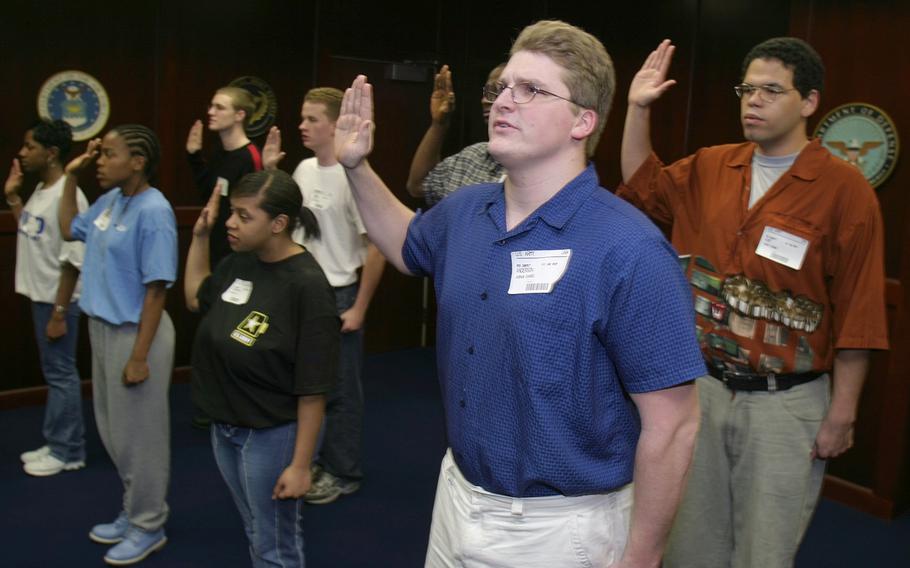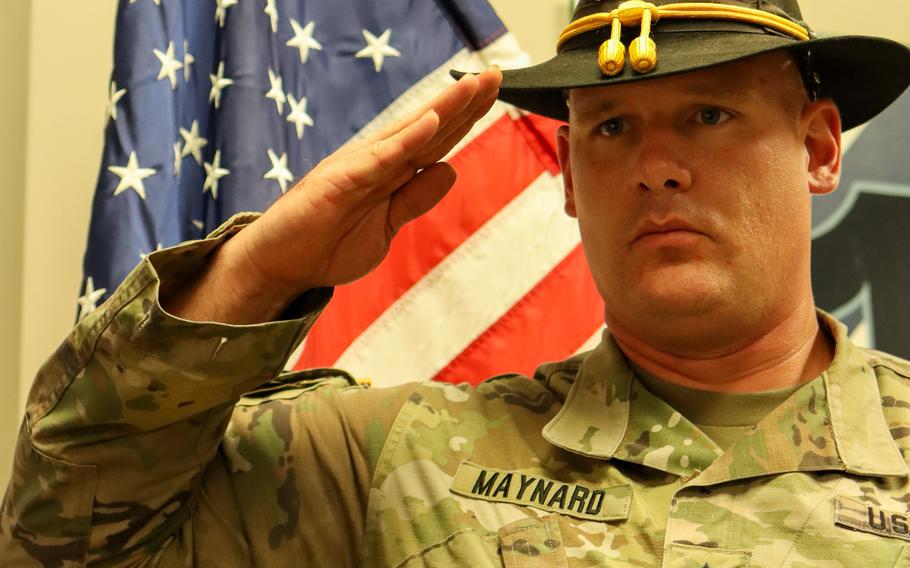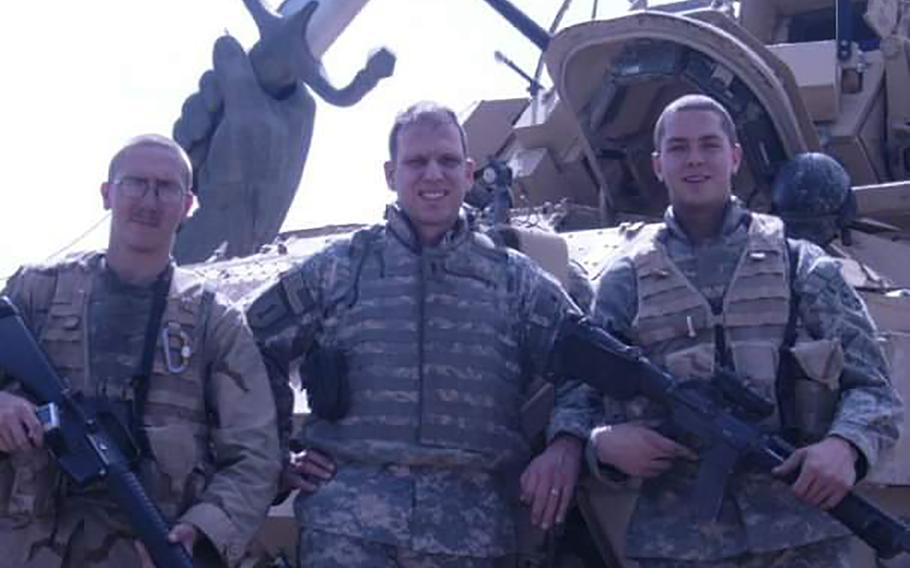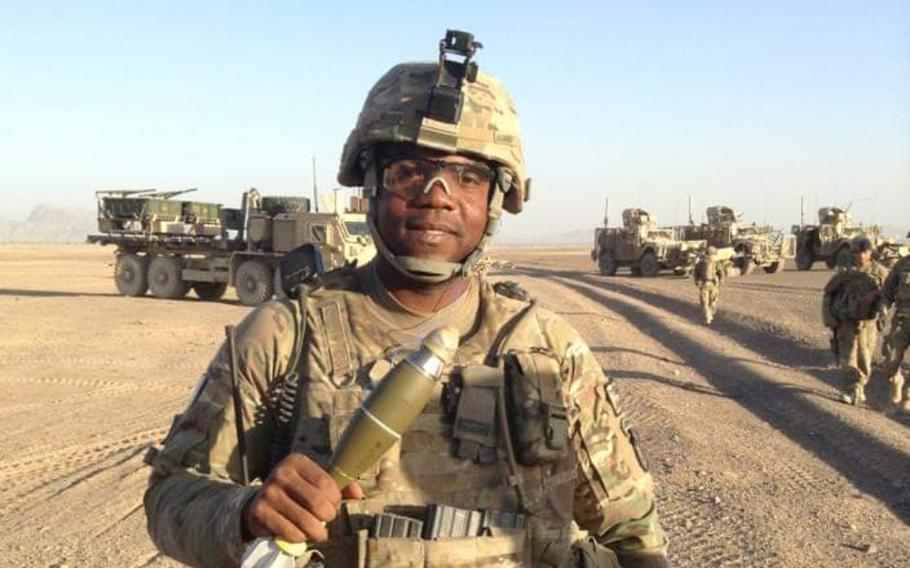
Army inductees, including Josh Anderson, center, take the oath of enlistment at the Federal Building in Richmond, Va., Thursday, April 3, 2003. Anderson said at the time that his resolve to join the Army during wartime was “stronger than ever.” (Wayne Scarberry/AP)
Daniel Maynard was just four weeks into Army boot camp training at Fort Knox, Ky., to become a cavalry scout in what he expected to be a peacetime Army.
Then everything changed.
In the middle of a first-aid lesson, Maynard’s drill instructors pulled the Army recruits out of the class and lined them up in formation outside. It was Sept. 11, 2001. The United States had been attacked, the older soldiers told them, offering few details about al-Qaida’s assault on U.S. soil that millions of other Americans were watching live on television.
Later that day, after the startled recruits returned to their barracks, their instructors provided more details — the World Trade Center in New York City had been hit by a pair of airliners and the towers had collapsed. A plane crash landed in Pennsylvania. The Pentagon, the military’s headquarters in Arlington, Va., had been hit too. Thousands were dead.
The next words from Maynard’s drill sergeant would largely come to define the next two decades for the U.S. military. Twenty years later, Maynard recalls that sentence like it was spoken yesterday.
“He paused after explaining everything, to let it sink in, and then he told us: ‘Get ready, because you’re probably going to war,’” recalled Maynard, now an Army sergeant first class at Fort Stewart, Ga. “Then, it was just silence.”
“And I was shocked,” he said. “I think shock would probably be the best way to put it. Like, how could this happen? Like, how did nobody see this coming? I think some people were scared, but, I think really, we were all just shocked, because we just didn’t — none us expected that to happen.”

Army Sgt. 1st Class Daniel Maynard was one month into initial entrance training on Sept. 11, 2001. He has since served 20 years, including a combat tour in Iraq. (U.S. Army photo)
Maynard was inspired to enlist in large part by his grandfather’s World War II service, fighting in the Battle of the Bulge. But the peacetime Army that he joined no longer existed. The 9/11 terrorist attacks would drive Maynard’s now 20-year Army career, including a combat tour in Iraq. And it would motivate many of the 3 million or so Americans who served during the last two decades, according to the Costs of War project run by Brown University’s Watson Institute of International and Public Affairs.
In the weeks after the 9/11 attacks, former President George W. Bush would send American troops into Afghanistan, quickly toppling the Taliban, a hardline Islamic group that the United States accused of harboring the al-Qaida terrorists who launched the attacks on America, and began a search for Osama bin Laden, the leader of al-Qaida who would be killed nearly a decade later. In 2003, Bush ordered an American invasion of Iraq, which he accused of harboring weapons of mass destruction and supporting terrorists, expanding his Global War on Terror into a second country. After quickly toppling Iraqi President Saddam Hussein’s regime, U.S. troops would spend much of the next 20 years fighting terrorists, including al-Qaida fighters and, later, the Islamic State group. The Costs of War project estimates between 1.8 million and 3 million troops served in those wars, many having fought in both countries.
For Maynard, 38, the attacks and the ensuing wars they spawned were at least partially responsible for his decision to serve the 20 years typically required for retirement benefits.
“We're at war, whether we like it or not, and somebody has to do it,” he said of his decision to make a career out of soldiering during wartime. “So I can … sit around asking who's going to go, or I can raise my hand and say, ‘Here I am. Send me.’ I think that was the big part of why I chose to stay, to remain in the Army.”
For some others, the 9/11 attacks would drive them to recruiting stations, as the United States for a short time would see an uptick in Americans interested in military service and the willingness of higher-qualified candidates to enlist.
Studies by the Rand Corp., the Heritage Foundation and the Congressional Budget Office in recent years all show an increase in 2002 in military recruits’ aptitude tests scores, a temporary boost that Beth Asch, a RAND economist who has studied military recruiting for decades, said can likely be attributed to 9/11 and the patriotism it inspired. More candidates were showing up to recruiting stations with high school diplomas and often from higher-income families in areas that had not typically been producing military recruits during peacetime, she said.
But that would only last two to three years.
“There was like a 9/11-effect early on with recruiting in terms of an increase in interest in joining the military and an increase in quality of enlistment, but it shortly reverted back to normal levels,” Asch said.
Driven to serve
Those driven to military service by the 9/11 attacks came from many backgrounds, and often had previously considered enlistment but never fully committed, according to studies by Rand and individuals who served.
Army Sgt. First Class Brandon Harris was taking a test at his high school in Union Town, Ind., when the World Trade Center towers fell. As a 15-year-old sophomore, he recalled initial confusion after his teachers explained what had occurred in New York and at the Pentagon.

Brandon Harris, left, is pictured in Baghdad, Iraq, during his first combat deployment in 2006. Harris, now a sergeant first class, enlisted right after graduating high school in 2004, inspired largely by the 9/11 terrorist attacks. (Photo provided by Brandon Harris)
“It took me a while to wrap my head around what was actually going on,” recalled Harris, who has served five deployments in Iraq and Afghanistan as a combat engineer. “And after that it was anger.”
Joining the military “was always a thought” for Harris, but 9/11 provided the push he needed to enlist right after graduating high school in 2004. Without that catalyst, he said, he “probably would have went to college first.” Harris, 35, is certain he would not have made the Army a career without 9/11 and the combat operations that it spawned.
For Samuel L. Graves II, 9/11 probably changed the trajectory of his life, he said. Graves, now a staff sergeant at Fort Stewart, was a construction worker near his hometown of Chesapeake, Va., when the U.S. homeland was attacked.
He said he had not considered the military before 9/11, but just more than year later in early 2003 he enlisted in the Army. Later that year, he was deployed to Iraq.
The attacks and a desire to make a change in his life drove him to enlist in the Army, said Graves, a veteran of two tours in Iraq and another in Afghanistan.
“Half patriotic, half changing the lifestyle I was living,” Graves, 40, said of his motivation.

Army Staff Sgt. Samuel Graves II pictured during a combat deployment to Afghanistan in 2013, his third combat tour after enlisting in the Army in 2003. Graves said he was partially inspired to enlist by the 9/11 terrorist attacks. (Photo provided by Samuel Graves II)
While Graves joined the Army seeking a stable lifestyle, Harris, his battle buddy in the 3rd Infantry Division’s 1st Armored Brigade Combat, admitted he was motivated in part by 9/11. He wanted to fight.
“It’s this kind of be careful what you wish for sort of thing, right?” Harris said. “But it was something I wanted to do, that I felt like I needed to do.”
By December 2005, he’d find the opportunity, when he was deployed for the first time to Iraq. He’d follow with two more Iraq deployments and two to Afghanistan.
Analysts said the desire to avenge the 9/11 attacks had waned among potential military recruits by 2005. With national headlines focused on the intensifying combat in Iraq and increases in U.S. casualty rates, fewer high-quality candidates were expressing interest in the military, Asch said. The 9/11-inspired recruiting boon was already over.
The Army missed its 2005 recruiting goal by almost 7,000. And the caliber of those it was enlisting fell, she said, noting the military services were increasingly using waivers to take in lower-quality candidates, including an uptick in those with past legal issues.
Recruiting would recover in the coming years, sparked largely by the 2008 economic downturn and increasing incentives offered by the Army and other military services, Asch said. The 9/11 attacks and fighting the wars spawned by them were rarely cited as a major motivator for military recruits, research by Rand and others showed.
Recruiting shifts post-9/11
Maynard served as a recruiter in the Memphis, Tenn., area from 2007 to 2009, as Bush first surged forces into Iraq and later former President Barack Obama ordered his own surge of troops into Afghanistan.
It was a difficult time to recruit, Maynard said. He found some individuals were still somewhat motivated by the 9/11 attacks, but most were looking for a good job, even if it meant combat.
“They still wanted to join the Army because they wanted to do their part,” Maynard said. “But, you could see that the desire to serve and do your part to help the nation win the war — you could see that was really starting to wane by that point.”
By the mid-2000s, Rand research showed most recruits were driven by the promise of steady jobs with benefits and, in many cases, large enlistment bonuses, Asch said. Military recruiting until recent years has remained fairly steady.
But when the Army missed its recruiting mark in 2018 for the first time since falling short in 2005, it served as a wake-up call to many at the Pentagon, officials said. The military needed to tailor recruiting efforts to a new generation of young men and women who have grown up in an increasingly digital world, and who were too young to remember the 9/11 attacks or were not even born yet.
The Army — and the other military services — have spent recent years revamping how they recruit, trying to reach Generation Z members, which is defined by the Pew Research Center as those born after 1996. So recruiting focused more on social media, video game streaming platforms and internet-based video services.
The newest generation has unprecedented access to information about the military that even those as recently as two decades ago could not have found quickly and easily online, said Army Maj. Gen. Kevin Vereen, the commander of U.S. Army Recruiting Command. And while those who joined around 9/11 felt called to fight for their country, the service’s newest recruits tell the Army they are largely driven by the desire to serve something larger or make the world a better place, the general said.
“After 9/11, this call to serve didn’t take much, because people wanted to do something, and we had a large amount of prior service folks wanting to come back on active duty or wanting to and deploy to fight,” Vereen said. “Today it is more challenging and we have to be creative. But, I think as long as we understand who our population is — that 17 to 30, 34 year old — it’s nothing that we can’t accomplish. We have to stay in the cusp of change, and as long as we do that we’ll be OK.”
Leading Gen Z and eyeing retirement
For those who have served since 9/11 or shortly after, the two decades of deployments, noncombat overseas assignments, training rotations and high-demand jobs that keep troops from their families has taken its toll, Maynard, Harris and Graves all agreed.
Maynard, who entered boot camp just one month before 9/11, plans to move shortly to a new assignment at Fort Benning, Ga., and intends to retire in the coming years to spend more time with his wife and two daughters.
Graves plans to retire to Florida after serving two more years. He plans to spend more time with his wife, who is a school teacher, and their three children.
“You know I gave 20 years to the military,” he said. “And, now I want to enjoy my family, you know, just because I wasn't deployed in combat, I was always gone somewhere. I really want to try and get as much family time as I can. I owe that to them.”
Harris has three more years until he reaches 20 years of service. He also plans to retire shortly after reaching that benchmark to spend more time with his wife and two kids.
“My daughter's getting older, she'll be 11 or 12 when I retire,” he said. “I want to be able to see her do whatever she wants to do. I want to be around for that. I want to be able to coach my son's sports teams, you know all these things that I don't necessarily have the option to do right now.”
The noncommissioned officers, who now oversee the new generation of soldiers early in their careers, said they can see some differences in the troops they are trying to shape.
The new generation of soldiers is smarter, Harris and Graves said. They are more tech savvy and comfortable questioning the status quo, they added. They want to make the world better, said Vereen, the general in charge of Army recruiting. And, they expect the older generation to be honest with them about the Army and the world in which they are serving, he said.
“They want the truth,” Vereen said. “They don't want you to lie to them, and they want to feel comfortable that we are telling them the truth ... from real people, not just some slogan on a billboard. They want real people with real experiences telling them the truth about the Army, and we’re trying to do that.”
The new troops have few, if any, opportunities to see combat now as the United States pulled its forces last month from Afghanistan and those serving in places such as Iraq and Syria primarily work to train local troops and rarely see fighting.
“But that's all I want to do because they hear us old timers talking about war stories and what we’ve done” in Iraq and Afghanistan, Graves said. “I don't think they realize what war does to you. But they still have that fire, and that's what they want to do.”
Maynard said his soldiers also want fight. But they don’t want to fight the wars of the last 20 years.
“It’s just not a motivator for them,” he said of 9/11. The 2001 terrorist attacks for many of them are just something they learn in history class, like he learned about the Japanese attack on Pearl Harbor.
“[Sept. 11, 2001] to them is like Dec. 7, 1941, to me,” Maynard said. “It happened a long time ago. I understand the importance of it, and I think they get it about 9/11. But to them, that’s ancient history.”
In an Army that has seen two decades of constant war, the new generation brings an “innocence” the military has not seen since 9/11, Maynard said. He tries to drive home to his young soldiers the importance of preparing for whatever the next threat might be.
“That’s where this generation of soldiers is at — they’re on Sept. 10, 2001,” he said. “They haven't seen Sept. 11 yet — not their Sept. 11.
“I hope to God they don’t ever have to see it.”